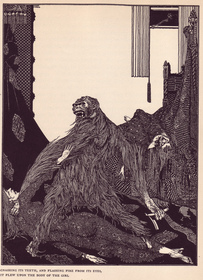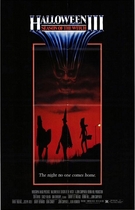Our editor-in-chief Nate Yapp is proud to have contributed to the new book Hidden Horror: A Celebration of 101 Underrated and Overlooked Fright Flicks, edited by Aaron Christensen. Another contributors include Anthony Timpone, B.J. Colangelo, Dave Alexander, Classic-Horror.com's own Robert C. Ring and John W. Bowen. Pick up a copy today from Amazon.com!
Cold Reads: The Murders in the Rue Morgue by Edgar Allan Poe
Cold Reads celebrates Writer of the Month for August! For the next four weeks, we will be studying the works of Edgar Allan Poe and celebrating his massive contributions to the horror genre.
Edgar Allan Poe is known for many things, one of which is being one of the leading voices in American Gothic literature. But his work in creating detective fiction as we know it today (along with the likes of Voltaire and E.T.A. Hoffman) is usually overlooked in favor of his more macabre pieces. Without Poe's help, sleuths such as Sherlock Holmes and Sam Spade may never have come into existence. "The Murders in the Rue Morgue" marks the first appearance of Poe's famous detective C. Auguste Dupin in a tale of homicide gone completely wild.
The ever-popular Unnamed Narrator becomes friends with Dupin during the former's travels to Paris. The two soon buy a gloomy mansion in which to live and talk of many deep things. One day while reading the paper, they discover a report of a double homicide that took place on the Rue Morgue in the locked room of a four story building. The grisliness of the crimes intrigues the analytical Dupin and he immediately sets forth to solve the mystery. But how can he identify a culprit who can enter a seemingly inaccessible room and whose screeching voice no two witnesses can agree on...?
*SPOILER ALERT* Abandon faith ye who enter here...
First and foremost, I think it to be common knowledge, at least amongst the fans of horror literature and film, that the criminal behind the fiendish crimes in this story is an orangutan. That's right. An honest to God monkey. Again, I apologize if I spoiled the big twist for those of you yet to read it. But really? A monkey? I don't think many people keep primates in their list of suspects for a murder-mystery.
Granted, the clues given during the story logically lead to such a conclusion. But I think it would have been more impressive if Poe had invented a way for the murderer to be of human origin, especially with all the baffling evidence collected at the crime scene. Don't get me wrong. Murderous monkeys are alright in my book. But employed in this story it just seems... well, lazy. And I hate to use that word in regards to Edgar Allan Poe. Unfortunately it's the sad truth. It's almost a big enough blow to bring down the entire story just because Poe doesn't play fair with his audience.
The major spicy element of the story is the murders. I came in expecting to see a whole string of gruesome offings and was a little shocked when I realized that there were only two killings. But I was even more surprised when I saw how bloody they were! The victims are an old woman (purported to be a medium) and her young daughter who are viciously slain within their home. The daughter is throttled by the massive claws of the ape who then stuffs the cadaver feet-first up the cramped chimney. The old dame has her throat slashed with a straight razor so forcibly that her head is nearly severed from her body. And that's before the orangutan tosses the body from the window. These icky descriptions are not written in the story for mere gore's sake. Poe's point is to illustrate just how brutal the murders are to make the final revelation plausible. Only a crazed beast of the jungle could be behind such abhorrent atrocities, Dupin rationalizes.
The murders bring enough punch into the story to liven up some of the more dull periods of the tale. The opening to the story is intriguing where our narrator compares the art of chess and card playing to the method of analysis. It is a worthy opening to a detective story, but some less patient readers will find themselves yelling "Get to the point!"
A fairly good portion of the story itself is also filled with "parlor talk," segments where Dupin and his companion simply sit and discuss the crimes rather than doing any active investigating. It is true that other detective tales include moments like these; I suppose I was just a tad put-off by them in this story since I went in expecting something a little different.
I wasn't completely disappointed though. The lead-up to the discovery of the murderer (as ridiculous as the conclusion may be) was indeed quite suspenseful and thrilling. The ending itself raises a few eyebrows as well. Although it is mentioned somewhat in passing, the story concludes with the mystery being solved but the ape remaining undiscovered. This open ending leaves you wondering what that homicidal orangutan might be up to in the city of Paris. Probably opened up a restaurant.
"The Murders in the Rue Morgue" is a very unique tale. It manages to lay the groundwork for detective stories to come and only helps to establish Poe as one of the greatest literary figureheads of all time. At the same time it becomes marred by an ending that is just a little too far into the realm of "What the hell?!" to solidify it as the ultimate story of detection and crime. While it is a worthwhile read, I advise any beginning readers not to use this story to introduce themselves to either Poe or the crime genre. Both have done much, much better.









"it just seems... well, lazy.
"it just seems... well, lazy. And I hate to use that word in regards to Edgar Allan Poe. Unfortunately it's the sad truth."
I don't think it's necessarily uncalled-for to refer to some of Poe's work as lazy. He was actually a known plagiarist. Not in any of his more famous work, of course.
I first read this story when
I first read this story when I was about 12 years old, and it amazed and delighted me then. Both we and the genre have grown older and more sophisticated, but this was at the beginning, and all honor to it!